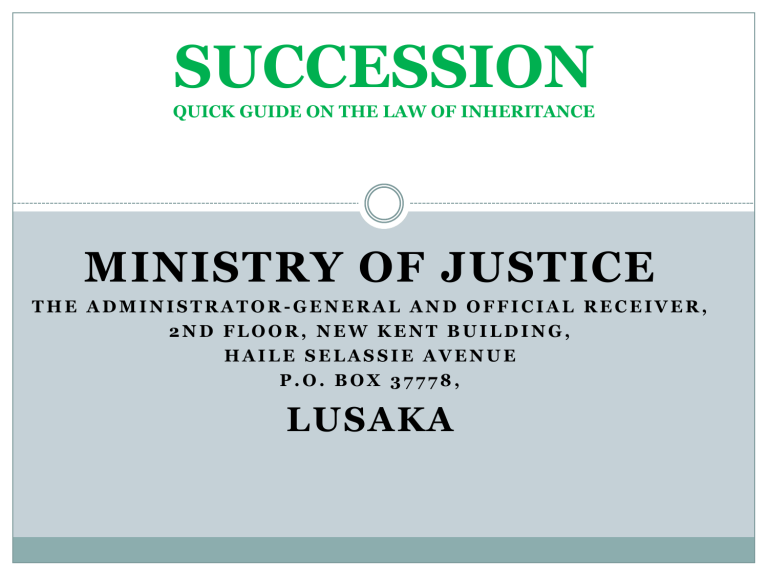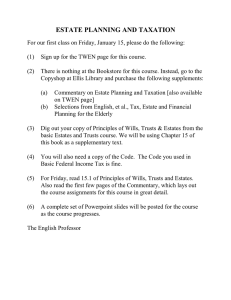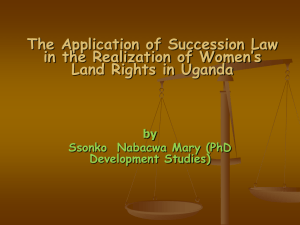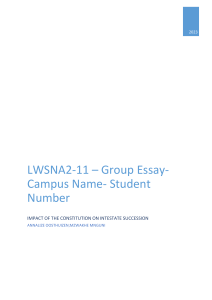
SUCCESSION QUICK GUIDE ON THE LAW OF INHERITANCE MINISTRY OF JUSTICE THE ADMINISTRATOR-GENERAL AND OFFICIAL RECEIVER, 2ND FLOOR, NEW KENT BUILDING, HAILE SELASSIE AVENUE P.O. BOX 37778, LUSAKA INTRODUCTION The purpose of this presentation is to equip participants with the following knowledge: a) Existing laws that apply when one dies without leaving a will; b) Laws that apply when one dies having left a will; c) How to make valid wills INTESTATE SUCCESSION What is intestacy? This is when someone dies without leaving a will. This means the person dies without leaving instructions on how their property is to be shared upon their demise. How is their property to be shared? The property shall be shared in accordance with the Intestate Succession Act INTESTATE SUCCESSION ACT Act No 59 of the Laws of Zambia This is the law that governs estates of persons dying without having left wills Enacted in 1989 It applies to members of communities to which customary law would have applied if this Act had not been passed. It effectively overrode customary law practices of succession THIS ACT DOES NOT APPLY TOa) Land which at the time of death of the intestate had been acquired and was held under customary law; b) Property which immediately before the death of the intestate was institutionalised property of a chieftainship and had been acquired and was being held as part of chieftainship property; c) Family property. WHO ARE THE BENEFICIARIES UNDER THIS LAW? a) b) The spouse This is the husband or wife of the deceased Parents This includes a guardian who has been responsible for the welfare and education of the deceased; Children means a child born in, or out of marriage, an adopted child, a child who is conceived but not yet born Dependents in relation to a deceased person means a person who was maintained by that deceased person immediately prior to his death and who wasa person living with that deceased person; or a minor whose education was being provided for by that deceased person; and who is incapable, either wholly or in part of maintaining himself; HOW IS THE PROPERTY SHARED? Personal Chattels These include clothing, articles of personal use or adornment, furniture and furnishing, appliances, utensils and all other articles of household use or decoration, simple agricultural equipment, hunting equipment, books, motor vehicles and consumable stores but does not include chattels used for business purposes, money or securities for money; Personal Chattels belong to the spouse and children absolutely HOW IS THE PROPERTY SHARED? CONT. Where it was a polygamous marriage a) Each widow and her children shall be entitled to their homestead property; and b) The widows and their children shall be entitled to the common property in equal shares HOW IS THE PROPERTY SHARED? CONT. Houses Where there is only one house, this shall devolve upon the spouse and children Provided thata) where there is more than one surviving spouse or child or both they shall hold the house as tenants in common; and b) the surviving spouse shall have a life interest in that house which shall determine upon that spouse's remarriage. More than one house a) Where the estate includes more than one house the surviving spouse or child or both shall determine which of the houses shall devolve upon them and the remainder shall form part of the estate. HOW IS THE ESTATE SHARED? 20 % to the spouse 20% to the parents 50% to the children 10% to the dependents The act also provides how the estate is to be shared where there is an absence of any of the above named categories ADMINISTRATORS Who can be an administrator? Any interested person above the age of 18 years How many people can be Administrators? You can have up to 4 administrators DUTIES AND FUNCTIONS OF ADMINISTRATORS (a) to pay the debts and funeral expenses of the deceased and pay estate duty if estate duty is payable; (b) to effect distribution of the estate in accordance with the rights of the persons interested in the estate under this Act; (c) when required to do so by the court, either on the application of an interested party or on its own motion(i) to produce on oath in court the full inventory of the estate of the deceased; and (ii) to render to the court an account of the administration of the estate. OFFENCES Section 14 Any person who (a) unlawfully deprives any person of the use of (i) any part of the property of the deceased to which that person is entitled under this Act; or (ii) any property shared with the deceased to which this Act applies; or (b) otherwise unlawfully interferes with the use by any person of any property referred to in paragraph (a); shall be guilty of an offence and liable on conviction to a fine not exceeding seven hundred and fifty penalty units or imprisonment not exceeding two years, or both. OFFENCES Cont. Section 35 An administrator or guardian who wrongfully deprives a minor of property be guilty of an offence and liable upon conviction to a fine not exceeding five hundred penalty units or to imprisonment not exceeding one year, or both. (2) When any person is convicted of an offence under subsection (1), the court may, in addition to any penalty which may be imposed(a) order the restitution to the minor of the property which has passed in connection with the commission of the offence; (b) if the property cannot be restituted or cannot be found, order the convicted person to make compensation to the minor of such sum as the court may assess as the value of the property. WILLS When one dies leaving a valid will they are said to have died testate. What is a will? This is a document which provides how one wishes their estate to be dealt with upon their demise. Who can make a will? Any person who is not a minor A person who makes a valid will is called a testator WILLS AND ADMINISTRATION OF TESTATE ESTATES ACT Cap 60 0f the Laws of Zambia This is the law that governs the making of valid wills WHAT IS A VALID WILL? A will is valid if; (a) It is in writing; (b) is signed at the foot or end, by the testator or by some other person in the testator's presence and by his direction; and (c) the signature referred to in paragraph (a) is made or acknowledged by the testator in the presence of two witnesses present at the same time who have also signed at the foot or end of the will. WITNESSES TO A WILL Any person who is not blind and is of sound mind, may be a witness to a will. A beneficiary cannot a witness to a will unless there are two other witnesses present who are not beneficiaries. A beneficiary who intentionally causes the death of a testator loses their entitlement under a will WHAT POWERS CAN ONE EXERCISE IN A WILL? (a) dispose of any property which is theirs or to which they will be entitled at the time of their death or to which they may be entitled thereafter; (b) appoint one or more persons to be executor or executors;(explain) (c) Act attach certain terms and conditions in relation to the disposition of any part of their estate; or (d) appoint a guardian for their minor child where the surviving parent of the minor child is incapable, by physical or mental infirmity, to take guardianship of the minor child WHO IS ENTITLED TO INHERIT UNDER A WILL? The testator has a right to bequeath to anyone However the Act provides priority dependants. These are the persons that have to be considered in a will Spouse Child Parent Where these have been left out they can petition the court for variation of the will. OFFENCES UNDER THE WILLS ACT Section 58 Depriving a minor of property- 1 year Section 65 Intermeddling – fine and/or imprisonment not exceeding 2 years The office of the Administrator General and Official Receiver FUNCTIONS Administration of estates of persons who die testate (with a Will) where the Administrator General is appointed executor. Administration of estates of persons who die Intestate Administration of estates of bankrupt persons To act as Official Solicitor in the estates of patients with mental disorders Oversight over Receivers and liquidators of Companies under the provisions of the Corporate Insolvency Act, No. 9 of 2017 Performing the functions of Receiver or Provisional Liquidator where the official receiver is appointed as such. SERVICES PROVIDED BY THE ADMINISTRATOR GENERAL Provide advice regarding estates Assist in conflict resolution amongst family members Draft wills for clients who may require them Keep wills when requested to do so by clients Sensitise members of the public LOCATION The Administrator-General and Official Receiver, 2nd Floor, New Kent Building, Haile Selassie Avenue P.O. Box 37778, LUSAKA The Administrator-General and Official Receiver, Copperbelt Provincial Administration (Cabinet Office) 1st Floor, Buseko Avenue P.O. Box 70153 NDOLA




